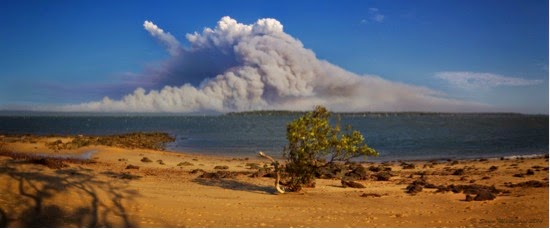Summer Nature Notes
 |
Bush Stone Curlew. (Bruce
Martin)
|
Koala breeding season is in full swing over summer. This is a
time of increased activity and movement on the ground between trees,
particularly from around November to January, and extra care should be taken
when driving near koala habitat during this time especially around all the
townships, Myora and along the road to Amity. The breeding season commences
around July-August and can extend through until around April-May.
Migratory bird numbers are peaking as the last of the juveniles
arrive from their breeding grounds in Siberia and Central Asia. This is a great
time to check out Dunwich’s Bradbury Beach high tide roost (early in the day
before disturbance) and the tidal wetlands at Amity and Swan Bay. Birds to look
for include Eastern Curlew, Whimbrel, Bar Tailed Godwit and Grey Tailed
Tattler.
Many woodland trees including Brush box, Blackbutt, Pink
Bloodwood and Euodia are in blossom. Midyim and many boronias are also summer
flowerers. Look out for Paper Daisies flowering on the dunes and Coast Banksia
on the headlands.
From late November to late January Loggerhead Turtles are
breeding and laying eggs on the island’s ocean beaches. If you are out walking
early on the beach and sight turtle tracks please notify the island wildlife
carers so the nest site can be monitored and protected.
The calls of the migratory Channel-billed Cuckoos and Eastern
Koel add to the island’s beautiful birdsong soundscape dominated by
honeyeaters, lorikeets, kookaburras (and cicadas!) over summer. Bush stone
curlew breed over summer and their courting duets are often heard at night.
Look out for Dollarbirds which have arrived from PNG to breed perching
prominently on the tops of trees.
In January dugongs are herding
and breeding in Moreton Bay. On days when the Bay is very placid dugongs are
sometimes spotted from the ferries. Straddie’s only east-west migratory
shorebird, the Double Banded Plover arrives from New Zealand – this little bird
is often spotted on Flinders Beach and Main Beach.
Mary Barram

